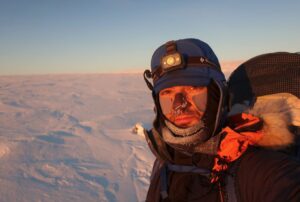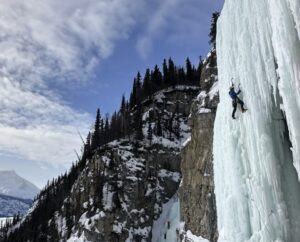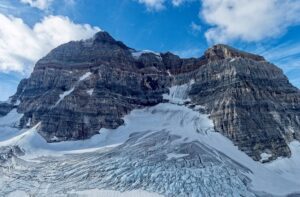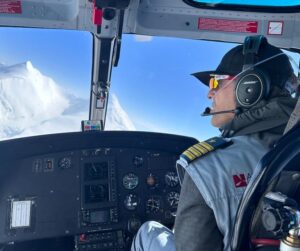Mathieu Maynadier and Tom Livingstone really made the best out of the only 4 days of good weather out of 30 in their part of the Karakorum. They opened a new route on the southeast ridge of Pumari Chhish East (6,850m), although they retreated 100m shy of the summit.
This means that Pumari Chhish East remains unclimbed. The main peak of Pumari Chhish (7,492m) has been climbed only once before, in 1979 by a Japanese team that eventually summited via the north ridge.
“In those four days, we made an attempt at the one reasonable line we could see,” said Livingstone. “The ‘southeast-ish’ ridge of Pumari Chhish East.”

Mathieu Maynadier describes Pumari Chhish area as magical. Photo: Tom Livingstone
Added Mathieu Maynadier: “After light acclimatization (two nights at 5,200m) in variable weather, when the first good window came, we decided to try the Southeast Ridge…Although less steep than our initial goals, it gave us some hardcore fight with the snow and some crazy ridge sections typical of the Karakorum.”

Karakorum alpine-style, in the briefly great weather. Photo: Tom Livingstone
Livingstone described it as three days of “classic Karakorum ridges, aka crazy snow mushrooms and cornices”.
For those 72 hours, the pair enjoyed excellent weather. “No clouds and more than 150km view,” Maynadier said.

No wonder Maynadier and Livingstone called their route the Karakorum Mushroom. Photo: Mathieu Maynadier
Their luck runs out
On the fourth day, an unexpected snowstorm descended as the climbers approached the summit.
“We pushed to the maximum,” said Maynadier. “Around 11 am, the spindrift was too strong, so after reaching the top of the mixed terrain at the base of the final mushroom, we decided to stop.” They were about 100 vertical metres short of the summit.
“Sure, I go climbing in Scotland in winter in a storm, but it feels quite different at almost 7,000m,” said Livingstone.

Climbing in foul weather on the fourth day. Photo: Tom Livingstone’s IG
When they returned to their tent, they found it flattened. They described their descent as epic, because of constant avalanches.
“In hindsight, [retreating] was the right decision,” said Livingstone. “We were already pushing it — pitch after pitch — and weren’t sure what lay ahead, with more bad weather inbound.”
The pair are heading home now but will return to the Karakorum in the future to tackle the original project they had in mind, which they decline to reveal. “It was our first trip together and [it] worked perfectly,” Maynadier wrote.






